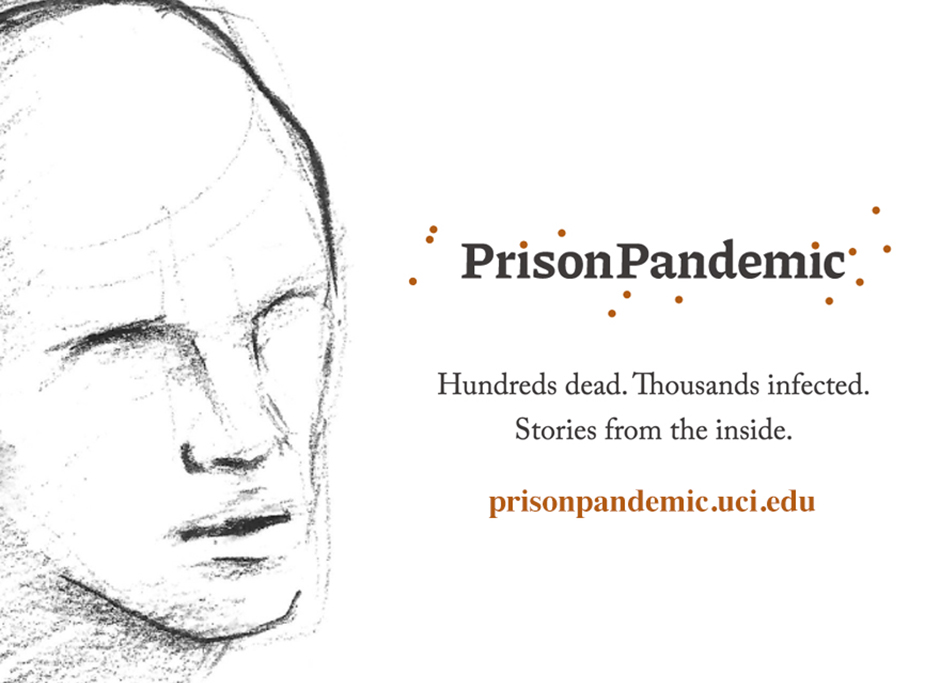the pandemic in prison, new B.A. program
Hundreds dead. Thousands infected. Stories from the inside.

Limited access to cleaning supplies and protective face coverings. Months-long, 24-hour lockdowns with no family visits. Living quarters that make social distancing next to impossible. And a case rate that keeps climbing. The COVID conditions inside California’s prisons paint a stark reality of the mental and physical health toll the pandemic is taking on incarcerated individuals, says Kristin Turney, UCI sociologist. She’s part of a group working to raise public awareness of the Coronavirus crisis in the state’s prisons through a new website, www.prisonpandemic.uci.edu.
“These personal stories highlight hardship in a profound way,” says Turney. “And what’s really poignant are the racial disparities in our country’s incarcerated population. People of color and those from low-income communities are overrepresented in prison, meaning that the plight of the pandemic in prison is being felt more heavily among an already marginalized population. By sharing their stories, we’re giving them a platform they may not otherwise have.”
Launched in March, the site features first-hand accounts of what the pandemic looks like in prison as told through letters and recorded phone calls collected via the project’s anonymous hotline. The work is a collaborative, donor-funded effort between Turney; UCI criminology, law & society associate professors Keramet Reiter and Naomi Sugie and graduate students Joanne DeCaro and Gabe Rosales; and other School of Social Ecology field study students, as well as student volunteers.
“Being incarcerated is itself a risk factor for chronic health problems and early mortality, yet those in prison face persistently inadequate access to medical care. We hope the accounts we collect will reveal how COVID-19 has magnified these problems, and be a resource for journalists and scholars alike seeking to understand and mitigate the health harms of incarceration,” says Reiter who has played a key role in creating the first in-prison B.A. completion program offered by the University of California system.
People of color and those from low-income communities are overrepresented in prison, meaning that the plight of the pandemic in prison is being felt more heavily among an already marginalized population.
By sharing their stories, we’re giving them a platform they may not otherwise have.
Statistics emphasized on the site track current COVID outbreaks in the state’s prisons alongside personal narratives to highlight the human element that is often missed in public perception and understanding of the experience of individuals who are incarcerated, says Sugie.
“We often think of prisons as closed institutions that do not affect us or our communities. But, in fact, our society’s health, safety and well-being are closely tied to our prisons. The COVID crisis in prisons is revealing long-standing and entrenched problems with mass incarceration generally,” she says.
Joanne DeCaro, who has helped curate and transcribe the stories, hopes the project will help draw attention to the magnitude of mental and physical health concerns that are apparent in each of the shared narratives.
“The stories we have collected so far overwhelmingly describe a sense of helplessness and fear,” she says. “Helplessness because they often have limited to no means to protect themselves, and a strong fear that they might never see their loved ones again.”
The group hopes to expand the project’s focus beyond COVID-19 narratives to continue raising awareness of health and racial disparities inside California’s prisons, and work toward effective solutions to the state’s overcrowded prisons.
For more information, visit www.prisonpandemic.uci.edu. To share a prison pandemic
story, anonymous calls can be made to 949-824-6600 (Monday-Friday, 5 p.m. to 9 p.m.)
and letters may be mailed to PO Box 4430, Sunland, CA 91041. The project is collecting
calls from those currently incarcerated, recently incarcerated loved ones of those
incarcerated, and staff. The hotline accepts collect calls.
UCI to launch UC's first in-prison B.A. completion program
One of the most effective interventions for reducing recidivism is higher education, and since 2014, all 35 California state penitentiaries have partnered with community colleges to give prisoners the chance to get an associate degree. Expanding on this idea, UCI is launching a new initiative, Leveraging Inspiring Futures Through Educational Degrees. The first in-prison B.A. completion program offered by the University of California system, it will enable incarcerated individuals to earn a bachelor’s degree in sociology from UCI.
“At least 95 percent of people in California prisons will return to their communities, and most will lack the tools to compete in today’s job market,” says LIFTED director Keramet Reiter, UCI associate professor of criminology, law & society. “Educational programs are a reallocation of the funds already being spent in the penal system and achieve much more successful objectives. Lower recidivism means less crime and improved long-term public safety.”
All students – incarcerated or not – who get a California community college degree in certain majors and maintain a specified GPA are guaranteed transfer to a UC school. LIFTED will leverage this existing track. Prisoners who earn an A.A. in sociology from Southwestern College with a GPA of at least 3.5 will be eligible for admission to UCI. They will be able to obtain a B.A. while serving their sentence or be eligible to matriculate on campus if they’re released before finishing their course of study.
“In the past five years, there have been policy revisions in California. Many people who were convicted as juveniles or under the three-strikes law for nonviolent felonies will be released sooner than expected,” Reiter says. “LIFTED will provide them with a real chance to make positive changes in their lives and society. As for those who will remain incarcerated, someone with a bachelor’s degree is better equipped to function and contribute, even while constrained by prison walls.”
The LIFTED steering committee also includes Pavan Kadandale, associate professor of teaching in molecular biology & biochemistry; Valerie Jenness, Distinguished Professor of criminology, law & society; Carroll Seron, professor emerita of criminology, law & society; and members of UCI’s Underground Scholars Initiative, a group of formerly incarcerated students and their allies.


connect with us: